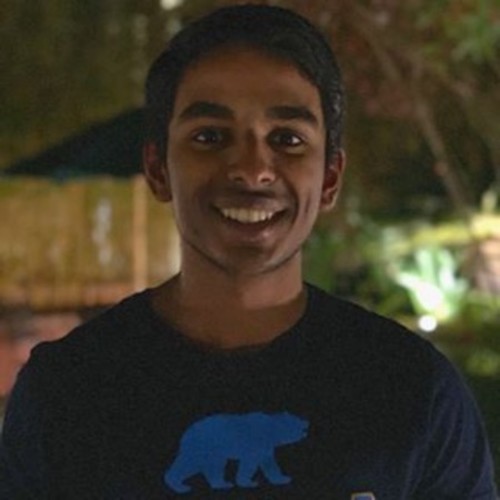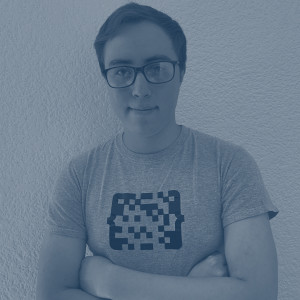Arjun Subramonian, 21

Arjun attended their first hackathon, Rose Hack 2019, the same weekend as the Women’s March. Exhausted from the march, they were excited while zipping from Downtown LA to Riverside to go code and meet new people. As a queer person of color, Arjun often feels excluded from tech spaces, but Rose Hack was a warm, intimate, and welcoming environment that they loved. They have amazing memories from the event, like learning about digital signal processing, Python, and Librosa, walking miles with other hackers to get boba, and eating sesame noodles at 3 AM. Arjun worked there with a team to create their favorite project, PyMash, an application that mashes up pairs of songs in a user’s music library and identifies the best mash-ups. They found it really awesome creating a novel algorithm that analyzes pitch intervals and beats to not only produce the mash-ups but quantify their quality. They enjoyed getting excited with the mentors and judges about their project when asking for help and presenting the end product, and the project even won third best hack.
As a fervent champion of justice, equity, and inclusion in tech, Arjun collaborated with other queer and trans (QT) students at UCLA to organize QWER Hacks, the first collegiate LGBTQIA+ hackathon in the United States. QWER Hacks 2020 increased the visibility of the QT community in tech, and brought QT individuals and allies together to build products that benefit marginalized individuals. Arjun was blown away by the creative and impactful applications that attendees engineered, such as an app that leverages augmented reality to allow trans and non-binary people to experiment with gender expression, and an online game through which parents can practice supporting their QT child via role-playing. Arjun honed a welcoming and inclusive environment at the event by organizing empowering speeches and workshops from QT tech role models. Topics ranged from how deep learning models encode and amplify social biases and how the Trevor Project uses artificial intelligence (AI) to help QT youth in crisis, to imposter syndrome and educational technology. Furthermore, Arjun facilitated intersectional mentorship groups so that attendees could talk with tech leaders who share their identities. Such groups created spaces for often-erased QT voices, like those of bi/pan people of color and trans and gender non-conforming individuals to be heard.
Arjun was elated to hear lots of positive feedback from QWER Hacks 2020 attendees. Many found QWER Hacks to be their favorite hackathon, citing its focus on mental health and intersectionality, as well as the lack of toxic masculinity. First-time hackers shared that they never felt comfortable attending any other hackathon, and the event successfully included non-CS students, with many sociology, art, and political science major attendees. Many had even flown across the country for the event, and they emphasized that the safeness and inclusivity of the space validated their decision.
QWER Hacks 2021 was hosted online, and despite worries about how the event would run and how to promote community-building in a virtual space, Arjun is extremely happy about how it turned out. The virtual format made it possible for LGBTQIA+ hackers around the world to attend the hackathon, with attendees from Jamaica, Nigeria, India, China, and more. The event also better prioritized the accessibility of their content with closed captioning and accessible color contrast, as they continue to make their space more inclusive. Attendees continued to amaze Arjun, creating awesome projects such as QUEERCARE, which builds LGBTQIA+ health communities by connecting users to peers, professionals, and resources, and QWERTUNES, which helps users discover LGBTQIA+ artists.
Arjun’s QWER Hacks co-organizers became their family, as they spent months contacting sponsors, securing a venue, marketing the event, processing applications, and brainstorming ways to enhance hacker experience and ensure a safe and inclusive space for everyone. Arjun was inspired by the genuine passion of such driven people to increase representation in tech, and their perseverance, enthusiasm, and support were contagious, showing Arjun by example how to stay organized, manage time, and boost morale as a leader. Additionally, one of the co-organizers recommended they apply to Google Queer Tech Voices, and attending that conference granted Arjun the opportunity to meet more amazing queer individuals. QWER Hacks was truly transformative, as it launched Arjun into the world of advocating for the diverse, brilliant, and talented queer people in tech! Most importantly, Arjun is grateful that their QWER Hacks co-organizers could create a space for them to embrace their identity and be openly queer in tech.
In addition to their work as an organizer for QWER Hacks, Arjun has also been a core organizer of Queer in AI, hosting socials at AAAI 2021 to build a stronger QT community in AI, machine learning, natural language processing, and computer vision. They have spoken on panels about queerness and intersectionality, organized initiatives to help LGBTQIA+ undergraduates get interested in AI research, and helped students navigate research and graduate school. They are currently organizing the Queer in AI ICML 2021 workshop to highlight the issues that trans, non-binary, and queer BIPOC face.
Organizing QWER Hacks and Queer in AI has inspired Arjun to continue doing organizational work and oriented them towards conducting academic research that would lead to a future with more equitable technology. Arjun will start their Ph.D. program at UCLA in graph machine learning (ML) and fairness research on a Eugene V. Cota-Robles Fellowship next academic year to become a professor, continuing to promote inclusivity in tech by mentoring marginalized students and collaborating with diverse researchers to promote the importance of representation and unique perspectives in computer science. They will teach and research fairness in how ML models encode and amplify social biases while guiding and encouraging students to solve interesting problems in the field. Arjun is fascinated by the issue of learning fair graph representations without demographics, as graph neural networks can learn problematic and spurious correlations for human-centered downstream tasks, and sensitive metadata is usually unavailable due to privacy laws. They will pursue solutions to this problem as part of their Ph.D. and conduct further research on the intersection of AI and social justice. Arjun recently wrote a paper connecting the harms AI systems pose to queer and trans people to broader societal trends, such as the desire to categorize people, pernicious social biases, and the erasure of nonbinary people, and presented it at the Resistance AI workshop at NeurIPS 2020. Additionally, Arjun is researching the negative effects of gender exclusivity in large language models. In the past, Arjun has worked on a deep learning-based optical system that inexpensively detects microbial resistance to antibiotics, and an interpretable framework for pretraining graph neural networks that improves performance on downstream graph classification tasks with scarce labeled data, like molecular property prediction, which can advance drug discovery and quantum chemistry. Ultimately, they hope to research and build equitable technology and empower and increase the visibility of LGBTQIA+ individuals in ML.
The future of human-centered AI is extremely concerning to Arjun as it has a track record of having disproportionately adverse effects on oppressed communities such as Black and trans and gender non-conforming individuals. From facial recognition to predictive policing, AI systems have become ubiquitous, yet don’t work and remain opaque in how they actually function. Therefore, exposure to how AI operates sociotechnical influences one’s ability to navigate the world. Since marginalized communities are the most negatively impacted populations, they would stand to gain the most from this exposure through an AI education, informed conversations about the technology, participating in community-based approaches, advocating against AI-induced harms, and pursuing opportunities in the field. However, access to an AI education remains disparate based on socioeconomic status, education level, race, and gender. AI education is only available to self-selected computer science students at privileged universities, and such programs typically fail to discuss the ethical and social implications of AI systems in terms of fairness, accountability, and transparency.
Given their advocacy for making AI education accessible to all, as Outreach Director of the Association for Computing Machinery AI at UCLA, Arjun launched and taught foundational machine learning concepts and AI ethics at primarily BIPOC, Title I LA schools. They led and worked with a brilliant team of instructors to develop content from scratch, carefully crafting each set of slides, coding Google Collab notebooks, and designing homework assignments. The classes are grounded in dialogue and student-centered learning, encouraging students to consider diverse perspectives and analyze the intersectional effects of AI; for example, students discuss why it's unfair and dangerous that commercial facial-recognition software performs poorly on dark-skinned women. Such conversations work to build a more diverse, aware, empathetic, and ethically-minded AI community, which has strong potential to ameliorate human-centered AI systems.
At UCLA, Arjun also guided the development of educational technology such as no filter and getting mean about error, made Kahoots, and recorded Tik Toks about ML in order to publish content in a fun, digestible, and accessible manner. They also founded and produced the “You Belong in AI!” podcast, empowering marginalized youth to pursue AI through inspiring interviews with researchers. Through their education initiatives, Arjun hopes to empower all members of society to talk about AI, fight algorithmic injustices with civic engagement and community-based approaches, and pursue careers in AI.
Arjun recently graduated summa cum laude from UCLA Engineering with a degree in computer science as the school-wide Outstanding Bachelor of Science and is now interning with the AllenNLP team at the Allen Institute for Artificial Intelligence. They broke ground on AllenNLP’s open-source fairness module, and are working to create easy-to-use metrics and bias mitigation algorithms for people to evaluate and improve the fairness of their language models.
Quick Facts
Arjun Subramonian, 21

Arjun attended their first hackathon, Rose Hack 2019, the same weekend as the Women’s March. Exhausted from the march, they were excited while zipping from Downtown LA to Riverside to go code and meet new people. As a queer person of color, Arjun often feels excluded from tech spaces, but Rose Hack was a warm, intimate, and welcoming environment that they loved. They have amazing memories from the event, like learning about digital signal processing, Python, and Librosa, walking miles with other hackers to get boba, and eating sesame noodles at 3 AM. Arjun worked there with a team to create their favorite project, PyMash, an application that mashes up pairs of songs in a user’s music library and identifies the best mash-ups. They found it really awesome creating a novel algorithm that analyzes pitch intervals and beats to not only produce the mash-ups but quantify their quality. They enjoyed getting excited with the mentors and judges about their project when asking for help and presenting the end product, and the project even won third best hack.
As a fervent champion of justice, equity, and inclusion in tech, Arjun collaborated with other queer and trans (QT) students at UCLA to organize QWER Hacks, the first collegiate LGBTQIA+ hackathon in the United States. QWER Hacks 2020 increased the visibility of the QT community in tech, and brought QT individuals and allies together to build products that benefit marginalized individuals. Arjun was blown away by the creative and impactful applications that attendees engineered, such as an app that leverages augmented reality to allow trans and non-binary people to experiment with gender expression, and an online game through which parents can practice supporting their QT child via role-playing. Arjun honed a welcoming and inclusive environment at the event by organizing empowering speeches and workshops from QT tech role models. Topics ranged from how deep learning models encode and amplify social biases and how the Trevor Project uses artificial intelligence (AI) to help QT youth in crisis, to imposter syndrome and educational technology. Furthermore, Arjun facilitated intersectional mentorship groups so that attendees could talk with tech leaders who share their identities. Such groups created spaces for often-erased QT voices, like those of bi/pan people of color and trans and gender non-conforming individuals to be heard.
Arjun was elated to hear lots of positive feedback from QWER Hacks 2020 attendees. Many found QWER Hacks to be their favorite hackathon, citing its focus on mental health and intersectionality, as well as the lack of toxic masculinity. First-time hackers shared that they never felt comfortable attending any other hackathon, and the event successfully included non-CS students, with many sociology, art, and political science major attendees. Many had even flown across the country for the event, and they emphasized that the safeness and inclusivity of the space validated their decision.
QWER Hacks 2021 was hosted online, and despite worries about how the event would run and how to promote community-building in a virtual space, Arjun is extremely happy about how it turned out. The virtual format made it possible for LGBTQIA+ hackers around the world to attend the hackathon, with attendees from Jamaica, Nigeria, India, China, and more. The event also better prioritized the accessibility of their content with closed captioning and accessible color contrast, as they continue to make their space more inclusive. Attendees continued to amaze Arjun, creating awesome projects such as QUEERCARE, which builds LGBTQIA+ health communities by connecting users to peers, professionals, and resources, and QWERTUNES, which helps users discover LGBTQIA+ artists.
Arjun’s QWER Hacks co-organizers became their family, as they spent months contacting sponsors, securing a venue, marketing the event, processing applications, and brainstorming ways to enhance hacker experience and ensure a safe and inclusive space for everyone. Arjun was inspired by the genuine passion of such driven people to increase representation in tech, and their perseverance, enthusiasm, and support were contagious, showing Arjun by example how to stay organized, manage time, and boost morale as a leader. Additionally, one of the co-organizers recommended they apply to Google Queer Tech Voices, and attending that conference granted Arjun the opportunity to meet more amazing queer individuals. QWER Hacks was truly transformative, as it launched Arjun into the world of advocating for the diverse, brilliant, and talented queer people in tech! Most importantly, Arjun is grateful that their QWER Hacks co-organizers could create a space for them to embrace their identity and be openly queer in tech.
In addition to their work as an organizer for QWER Hacks, Arjun has also been a core organizer of Queer in AI, hosting socials at AAAI 2021 to build a stronger QT community in AI, machine learning, natural language processing, and computer vision. They have spoken on panels about queerness and intersectionality, organized initiatives to help LGBTQIA+ undergraduates get interested in AI research, and helped students navigate research and graduate school. They are currently organizing the Queer in AI ICML 2021 workshop to highlight the issues that trans, non-binary, and queer BIPOC face.
Organizing QWER Hacks and Queer in AI has inspired Arjun to continue doing organizational work and oriented them towards conducting academic research that would lead to a future with more equitable technology. Arjun will start their Ph.D. program at UCLA in graph machine learning (ML) and fairness research on a Eugene V. Cota-Robles Fellowship next academic year to become a professor, continuing to promote inclusivity in tech by mentoring marginalized students and collaborating with diverse researchers to promote the importance of representation and unique perspectives in computer science. They will teach and research fairness in how ML models encode and amplify social biases while guiding and encouraging students to solve interesting problems in the field. Arjun is fascinated by the issue of learning fair graph representations without demographics, as graph neural networks can learn problematic and spurious correlations for human-centered downstream tasks, and sensitive metadata is usually unavailable due to privacy laws. They will pursue solutions to this problem as part of their Ph.D. and conduct further research on the intersection of AI and social justice. Arjun recently wrote a paper connecting the harms AI systems pose to queer and trans people to broader societal trends, such as the desire to categorize people, pernicious social biases, and the erasure of nonbinary people, and presented it at the Resistance AI workshop at NeurIPS 2020. Additionally, Arjun is researching the negative effects of gender exclusivity in large language models. In the past, Arjun has worked on a deep learning-based optical system that inexpensively detects microbial resistance to antibiotics, and an interpretable framework for pretraining graph neural networks that improves performance on downstream graph classification tasks with scarce labeled data, like molecular property prediction, which can advance drug discovery and quantum chemistry. Ultimately, they hope to research and build equitable technology and empower and increase the visibility of LGBTQIA+ individuals in ML.
The future of human-centered AI is extremely concerning to Arjun as it has a track record of having disproportionately adverse effects on oppressed communities such as Black and trans and gender non-conforming individuals. From facial recognition to predictive policing, AI systems have become ubiquitous, yet don’t work and remain opaque in how they actually function. Therefore, exposure to how AI operates sociotechnical influences one’s ability to navigate the world. Since marginalized communities are the most negatively impacted populations, they would stand to gain the most from this exposure through an AI education, informed conversations about the technology, participating in community-based approaches, advocating against AI-induced harms, and pursuing opportunities in the field. However, access to an AI education remains disparate based on socioeconomic status, education level, race, and gender. AI education is only available to self-selected computer science students at privileged universities, and such programs typically fail to discuss the ethical and social implications of AI systems in terms of fairness, accountability, and transparency.
Given their advocacy for making AI education accessible to all, as Outreach Director of the Association for Computing Machinery AI at UCLA, Arjun launched and taught foundational machine learning concepts and AI ethics at primarily BIPOC, Title I LA schools. They led and worked with a brilliant team of instructors to develop content from scratch, carefully crafting each set of slides, coding Google Collab notebooks, and designing homework assignments. The classes are grounded in dialogue and student-centered learning, encouraging students to consider diverse perspectives and analyze the intersectional effects of AI; for example, students discuss why it's unfair and dangerous that commercial facial-recognition software performs poorly on dark-skinned women. Such conversations work to build a more diverse, aware, empathetic, and ethically-minded AI community, which has strong potential to ameliorate human-centered AI systems.
At UCLA, Arjun also guided the development of educational technology such as no filter and getting mean about error, made Kahoots, and recorded Tik Toks about ML in order to publish content in a fun, digestible, and accessible manner. They also founded and produced the “You Belong in AI!” podcast, empowering marginalized youth to pursue AI through inspiring interviews with researchers. Through their education initiatives, Arjun hopes to empower all members of society to talk about AI, fight algorithmic injustices with civic engagement and community-based approaches, and pursue careers in AI.
Arjun recently graduated summa cum laude from UCLA Engineering with a degree in computer science as the school-wide Outstanding Bachelor of Science and is now interning with the AllenNLP team at the Allen Institute for Artificial Intelligence. They broke ground on AllenNLP’s open-source fairness module, and are working to create easy-to-use metrics and bias mitigation algorithms for people to evaluate and improve the fairness of their language models.



